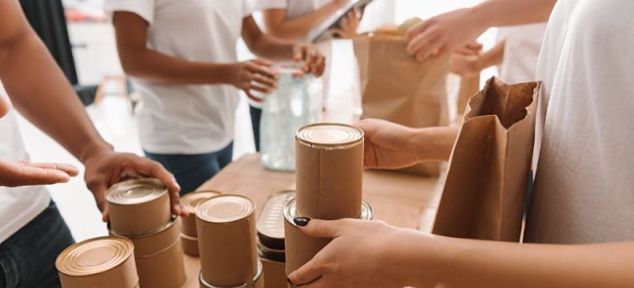STEP Outside the Classroom
STEP Outside the ClassroomBuilding Skills and Confidence with Our Community Service Food Bank Project
By Director Laura Rice
That’s why all students at Dearborn STEP assessment take part in the Community Service Food Bank project. The program not only teaches students important academic and life skills, but it teaches them empathy and an appreciation for their own life circumstances.
Learning to Make a DifferenceThe project, making donations to food banks in greater Boston, begins with students sharpening their research skills to find local food pantries. As a staff, we guide that process and help our students determine which communities have the greatest need.
Once they narrow the list of organizations and learn which foods are in high demand, students create a shopping list. Accompanied by a STEP staff person, some of the students visit the local supermarket.
This supports the therapeutic work they are doing at STEP to manage the anxiety of being in a crowded place. Other students take on different roles, decorating the food boxes or calling the food bank with follow-up questions. Still others pack the boxes, including adding handmade origami butterflies to each. Additionally, STEP sometimes partners with community health centers before holidays to give out food baskets.
Real-World SkillsWhether boxes for a food bank or baskets for families, the project builds academic and social-emotional skills such as math, empathy, budgeting and cultural competency. For example, students have a set amount to spend on food boxes. They have to factor in tax on some items and not on others without going over budget. Our students also learn that there is a more cultural piece to food buying to meet the taste and cooking preferences of different communities. STEP students additionally learn that not everyone has a refrigerator or oven – or even pots and pans. They learn what to buy for people who may not be able to refrigerate milk or who have only a microwave to cook meals.
It’s been a learning experience across the board for students to have those opportunities, talk about them with staff and each other, and to learn about other's circumstances and how to support them. It’s exciting to watch them grow as they manage this project.
One of the most important lessons that students take away from the Community Service Food Bank is to see their own privilege and to learn to give without getting something back. This helps them to realize how much they have, and their world expands. It’s not the thank you from the people you help. It’s you knowing you did something to make the world a better place.
Our goal with this project is to make sure that this realization, along with the skills developed, will remain with our students long after they complete the Dearborn STEP assessment program. This is why we do this work! |

 You know that classroom learning – whether in-person or remote – is an important component of a student’s academic success. Having the opportunity to practice what they learn in class through real-world, hands-on experiences is just as beneficial, especially for students who have struggled in more traditional educational settings.
You know that classroom learning – whether in-person or remote – is an important component of a student’s academic success. Having the opportunity to practice what they learn in class through real-world, hands-on experiences is just as beneficial, especially for students who have struggled in more traditional educational settings.